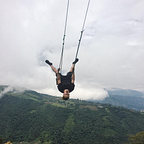what’s happening in there?
neuroscientist jeff hawkins’ book “A Thousand Brains: A New Theory of Intelligence”, aims to answer a quite straightforward question: “how do simple cells in the brain create intelligence?” the answer, dumbed down entirely, is that our brain cells create models of the world and we interact with those models. since i’m a wannabe nerd about this shit, the book fell straight into my wheelhouse and the terms/ideas presented corresponded with a number of things i’d already been exposed to. i’ve found in trying to talk to people how great the book is that many people don’t have a number of the concepts involved readily at hand. it’s worth taking some time to wade into these waters, if only because it might stretch out the edges of how/if you think about them. my own experience is that diving into this stuff more and more has made my life richer and more interesting.
there are a number of angles one can take that end up with insights about the phenomena of not interacting with the world directly, but through a model/screen. these insights can change what you think about the role your senses play in your experience. the angles are of many sorts and range from the world of woo to hard neuroscience (see jeff hawkins). some ways to peer at the phenomena can start practically, at experience.
think about the experience of sitting down and writing (or for that matter just having a conversation). it doesn’t feel like you are choosing each and every word. that would be difficult and exhausting. sometimes here or there you might get hung up and toss between a couple options; these moments feel more choosey. but for the most part what it feels like to put words into sentences is less mechanical. they pop out together in more or less order and act as sorts of predictions for where we might go next. we interact with those predictions and build the thoughts that carry us forward.
this experience i speak of above happens in a place. i don’t mean physically, but experientially. experientially it happens in consciousness, and it feels like something to have that experience. what david chalmers coined the “hard problem” of consciousness stems from this feature of feeling like something. it’s a lot easier for science to explain why behavior would arise from stimuli and sensory input than why a inner, subjective experience is along for the ride. we don’t know when in the range from slug to human brain the metaphorical lights turn on (or if they’re always on — and believe it or not some philosophers believe they’re never on) and it feels like something to be rather than one just having a reactive, strictly behavioral psychology.
the fact that you are conscious is in some sense the realest thing in the world in that it is the only thing you can be entirely certain of. you could physically be laying in a vat in the matrix, and your sensory stimuli could all be non-corresponding to a physical reality, but the fact that it feels like something is real to you. you can’t even be certain those you are interacting with are conscious. what if they’re just, as robert kirk first called them, “philosophical zombies”, and they are only physically behaving such as you are but the lights aren’t on?
we don’t know for sure why subjective experience seems to be a feature of consciousness. we don’t know why it feels like something to be conscious. we don’t have a perfect material science explanation for the one thing you can be most certain of, but there it is. with some reflection you can see pretty easily that the only place you experience anything is this place of consciousness. so, as a matter of a feature of the experience, senses “coming in” from the outer world happen in the same place as that place where you were building a sentence. and they happen in a similar way. you have predictions about what could be around you. as the stimuli pour in the you that feels like you exists in an interplay between those predictions and how they match with what’s being sensed. you might touch directly; the experience of that touch happens in consciousness.
anil seth has called moment to moment consciousness a “controlled hallucination”. i like this phrase. your perception is experienced but the model you’ve created is capable of cracking or distorting. we know this happens. when it’s mostly uncracked we call it controlled. we know for some it cracks in a big way. we know on a smaller level we have glitches of perception that feel entirely consistent because they are entirely smoothed out by our filters of prediction and modeling and interacting. you may for a very small split second think a shadow is a human body. your prediction was flawed; your sense input course corrects and you see what is a shadow (the success of this system is highlighted by the fact that the reverse rarely happens — you rarely think shadow and then shift to thinking human when human is not there). you move your head rapidly but your vision doesn’t crack or split frames like an old film; your visual field is smoothed out by your brain. you have a literal blind spot in your visual field (your punctum caecum) that you don’t experience. it is smoothed out.
your brain is a truly remarkable modeling mechanism that builds the entire world of experience based on what’s around it. what you have access to as a matter of direct experience is consciousness, not the physical world. the fact that your brain does this constantly and quite consistently with everyone else is a miracle. experiencing that mechanism is a step further. it is sensational. being a being is much less of a miracle than feeling like one is.
